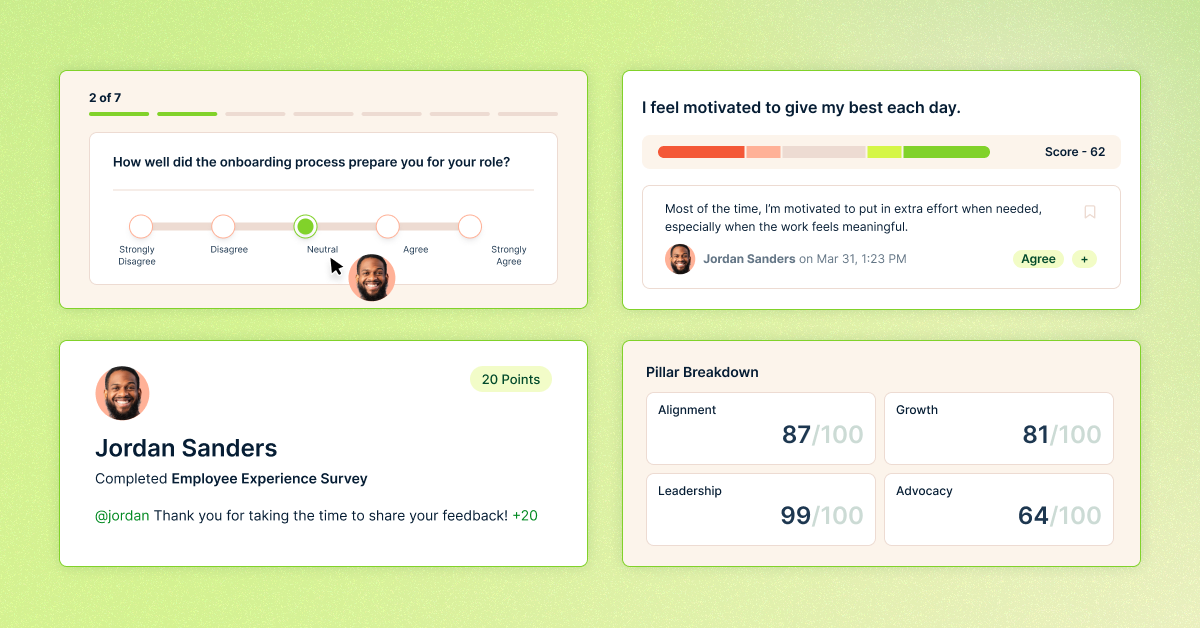101 Icebreaker Questions For Work: The Perfect Tool For Breaking Down Barriers

Awkward silences in the workplace can be seriously uncomfortable. Research shows that English speakers can rarely handle a pause of more than four seconds before the urge kicks in to fill the gap with small talk. But leaders can leap ahead of any discomfort by using a well-timed icebreaker conversation to keep the conversation flowing in the work environment.
Icebreakers don't have to be cringey or something you'd associate with fictional office boss Michael Scott. The right prompt can be:
- An amazing energizer
- The perfect segue into a meeting
- An opportunity for teammates to bond.
In this guide, we'll discuss the many benefits of breaking the ice at work and introduce you to our mammoth list of icebreaker questions to get you started.
What Are Icebreaker Questions For Work, And Why Are They Important?
Icebreaker questions are prompts to initiate conversations and break the ice in a new or uncomfortable setting. For example, your team leader might settle nerves in a meeting by asking everyone to describe, "If you were an ice cream flavor, which would you be, and why?" Whether it's a team meeting, training session, or networking event, icebreaker questions are fun, thought-provoking, and designed to cut through any tension to make people feel at ease in their surroundings.
Humans are social creatures with an inherent need to belong, but many of us have constant concerns that we don't. This can be severe for as many as 12.1% of the population who experience a social anxiety disorder at some point in their lives. Even those who don't require treatment or support in social situations can benefit from the structure of an icebreaker activity to lighten the mood and enable connections with others.
Psychologist and interpersonal relationship expert, Ty Tashiro, wrote in his book, Awkward: The Science of Why We’re Socially Awkward and Why That’s Awesome:
"When non-awkward people look past an awkward person's social clumsiness and take the time to really get to know them, they often discover good people who simply have a different view of the world. Awkward people often tell me, "I wish that people would give me a chance because I think that they would like me.""
This is precisely the essence of using icebreaker questions in the workplace. They give everyone a chance to get to know each other on common ground, resulting in benefits for the individual, the team, and the overall company:
Psychological Safety
Sharing thoughts and ideas is critical in the workplace, as it fuels creativity, innovation, and collaboration. But this isn't possible unless your company culture feels psychologically safe to speak up in. Employees must feel able to:
- Bring their whole selves to the workplace
- Challenge the status quo
- Brainstorm ideas without fear of ridicule
- Speak up against injustice without being punished
Although icebreaker questions are only the start of creating a safe space, they're an important way to reduce feelings of conflict and competition, enabling people to interact in a secure environment with minimal stress or pressure.
Positive Communication
Companies that promote a collaborative work culture are five times more likely to be high-performing than those that don't. But roadblocks such as limited social connections or a lack of information-sharing constantly threaten positive communication.
Breaking the ice encourages teammates to develop soft skills, including active listening, verbal communication, and trust-building. This leads to improved relationships with colleagues, enabling them to work better together in the long term. Even those anxious about sharing their stories or opinions will gain confidence in speaking up without fear of being censored or criticized.
Silo Destruction
Departmental silos happen when teams or departments become too focused on their goals, resulting in poor communication across the company. This disconnect can hinder progress and cause problems with customer service, team efficiency, and innovation.
Team bonding activities promote a unified company culture and encourage colleagues to think outside their area of responsibility. Icebreaker questions can be part of these team-building exercises to bridge the gap between departments and help teams move closer together. They introduce people to each other's roles while enabling them to learn more about their likes, dislikes, and hobbies.
Burnout Reduction
Burnout is at an all-time high, with Future Forum indicating 42% of desk-based workers are burned out, up from 38% in March 2021. Icebreaker questions are a great way to relieve stress and lighten the mood if you want to create a more enjoyable workplace. Although workplace burnout is a serious issue that must be tackled from many angles, laughing with colleagues will reduce cortisol levels and pump out endorphins (the body's natural painkiller) to support mental and physical health.

101 Get To Know You Questions For Work
We've pulled together some of the best icebreakers in the working world and put them into categories for you to choose from. Pick the ones that best suit your team or your situation, and don't be afraid to adapt them to your needs.
Fun Icebreaker Questions For Work
Fun questions are ideal for meeting new people for the first time or encouraging colleagues to get to know each other better. They're an immediate mood-booster, so use them when you want to inject energy and light-heartedness into the conversation:
- What superpower do you most envy, and how do you wish you could use it?
- What's your favorite meme, and why?
- If there was a zombie apocalypse, how would you survive?
- What's your guilty pleasure TV show, and why should we be watching it?
- What’s your favorite breakfast food?
- What would you choose an unlimited supply of in the office?
- What supernatural creature would you most like to be and why?
- What favorite fashion trend do you wish was still acceptable?
- If you were stranded on a deserted island with access to a stereo, what favorite song would you play on repeat?
- Which favorite cartoon character still makes you smile today?
- What's the weirdest food you've ever eaten, and would you try it again?
- What musical instrument have you always wanted to play?
- What's the most exciting thing about you that most people don't know?
- What would you choose if you could only eat one type of cuisine for the rest of your life?
- Which movie character would you most like to take a spin class with?
Icebreakers For New Employees
Successful onboarding should always include a chance for new joiners to meet their team in a group setting or during coffee chats with an onboarding buddy. If you're breaking the ice in a larger group, alleviate pressure by asking questions that existing team members may not already know about each other; that way, the new hire won't feel under the spotlight.
- What’s something you’re passionate about outside of work?
- What’s something you’ve accomplished that you’re super proud of?
- What’s your favorite way to spend the weekend?
- What’s your favorite sports team or athlete?
- What’s the most interesting place you’ve ever been to?
- Who would you choose if you could pick one person, living or dead, to have dinner with?
- What hobby would you like to try if you had the time?
- If you could learn any language, which one would it be and why?
- What did you want to be when you were a kid?
- What's your favorite movie soundtrack?

Icebreakers To Use During 1:1s At Work
One-to-one meetings between managers and direct reports don't need to be infused with tension. Instead, icebreakers can tear down seniority barriers and set the scene for some meaningful career growth discussions. Even though some of these questions may seem silly, they're a thoughtful way to uncover inner ambitions that a manager should know about.
- What's your absolute dream job, and has it changed since you were 11?
- What’s the best piece of advice someone has ever given you?
- What’s the worst advice someone has ever given you?
- If you could teach a course on any subject, what would it be?
- If you could only choose one word to describe your working style, what would it be?
- What’s the best thing you’ve ever achieved in the workplace?
- What’s one thing that’s been challenging for you recently?
- What are your professional goals for the next year?
- What’s something you’ve been reading or learning about lately that’s grabbed your attention?
- What’s one thing you’d like to improve about your work environment?
- What professional opportunity are you looking forward to in the next three months?
- What’s one thing you’d like to try in your role that you’ve never done before?
- Do you have any hidden talents outside of work you'd like to share?
Icebreakers To Use During Team Meetings
Whether you hold meetings face-to-face or in a remote team environment, these sessions should be a time for all participants to express their opinions. Icebreaker questions are a healthy way to encourage open dialogue between colleagues and ensure your introverts, extroverts, ambiverts, and people of any rank or seniority feel comfortable speaking up in front of the team. Try these team building questions out for size:
- What was your first job, and how long did you work there?
- If you could jump in a time machine, would you go forwards or backward?
- Which historical figure would you most like to have a Zoom meeting with?
- Which fictional family do you think our work team is most like and why?
- If you could choose our work dress code, what would it be?
- What would your entrance theme song be for our end-of-year party?
- What advice would you give yourself if you were starting your career again?
- What’s your cellphone wallpaper today?
- Who’s the smartest person you know in the office?
- Where would your dream house be located?
- Which fictional character would you like to invite to our next team meeting?
- Which team member would you nominate to join Mount Rushmore?
- What’s the best trip you’ve ever been on and why?
- What qualities do you value most in a friend?
- What do you think makes your team particularly unique?
- What’s your favorite way to collaborate with colleagues?
- What’s a pet peeve your teammates should know about you?
- If you could switch jobs with anyone in the company for a week, who would it be?

Icebreakers To Use During Networking Events
Networking events offer the opportunity to meet new people, hear incredible speakers, and learn about the latest industry trends. But these icebreakers can be useful if you've ever cringed at making small talk during a networking drinks reception. They're ideal for sparking meaningful conversations with strangers and avoiding awkward silences. As Headshot Photographer Vadym Guliuk puts it:
“Let's be honest; we'd rather be sharing than listening to a general keynote or be engaged in a basic 'business card exchange' conversation.”
- What inspired you to pursue your current career path?
- What’s your favorite thing about your company culture?
- What’s the most exciting project you’ve worked on in your career?
- What’s a skill you’d like to learn or improve?
- Who’s the most famous person you’ve ever met (or almost met)?
- If you had 15 minutes of fame, what would you do with it?
- What’s your go-to productivity hack?
- What's something you'd like to see changed in your industry?
- What’s your favorite way to unwind after a busy work week?
- Besides your phone, what's your favorite tech toy, and why can't you live without it?
Would You Rather Icebreaker Questions
"Would you rather" questions are designed to be thought-provoking. They allow people to explore a question with two possible answers — each a head-scratcher! Although these are closed-ended questions, many participants will naturally feel inclined to explain their reasoning. But if not, don't be afraid to dig a little deeper, as they're not overtly sensitive topics.
- Would you rather live in a world without music or movies?
- Would you rather live in a world without technology or nature?
- Would you rather be the funniest or most intelligent person in the room?
- Would you rather have a personal library or a personal movie theater?
- Would you rather never have to sleep or never have to eat?
- Would you rather have a photographic memory or a perfect pitch?
- Would you rather live in a treehouse or a houseboat?
- Would you rather that your pet could speak to you or that you could speak all other languages fluently?
- Would you rather have the ability to fly or be invisible?
- Would you rather have a job requiring lots of travel or a lot of public speaking?
- Would you rather live in the future or the past?
- Would you rather have the power to move objects with your mind or read other people's thoughts?
Holiday Icebreaker Questions
Themed icebreaker questions can boost morale and get you in the holiday spirit. But keep your questions inclusive by sticking to the "holidays" theme rather than focusing specifically on Christmas or Thanksgiving, which some of your team may not celebrate.
- What’s your favorite holiday movie and scene you’d most like to recreate?
- What's your favorite holiday tradition, and can you remember the first time you enjoyed it?
- Do you have any unique family traditions during the holiday season?
- What’s the best gift you’ve ever received?
- What’s the best gift you’ve ever given?
- Would you prefer to spend every holiday season in the snow or on the beach?
- Have you ever spent the holidays in a different country?
- What’s your favorite type of holiday music?
- Have you made any New Year’s resolutions?
- Have you ever volunteered during the holidays?
- What's your favorite food to eat during the holiday season?

Icebreaker Questions For Employee Resource Group Members
Employee resource groups enable employees with similar backgrounds, interests, and experiences to connect in the workplace without fear of isolation or discrimination. Often these groups include employees from various teams or departments who may not come across each other in their day-to-day roles. Icebreakers can range from fun introductions to more serious prompts about diversity.
- What do you hope to accomplish as a member of this ERG?
- Which cultural tradition would you like to raise awareness of?
- What diversity best practices have you seen in other organizations that you'd like to introduce here?
- What inspired you to join the group?
- Have you experienced discrimination during your career?
Going Deeper Icebreaker Questions
Let's say you have an established team who know each other well on a surface level. Now that you're past the introductions, reflective icebreaker questions will encourage people to peel back a few more layers and share more of their personalities with their coworkers. Tread carefully with these questions, and don't push people to share more than they're willing to.
- What’s your favorite thing about working here?
- Which famous actor would play the story of your life?
- What book has had the biggest impact on your life and why?
- What were the names of your toughest teacher and favorite teacher at school, and how have they shaped your career?
- What’s been your biggest life lesson?
- How would you describe the most interesting person you’ve ever met?
- Can you name something you've found fulfilling lately?

10 Best Practices When Using Icebreakers
Icebreaker questions are energizing and interactive. They can be a fun way to start a meeting, workshop, or team-building activity. But your icebreaker questions must be well thought out and appropriate for the group type, size, and setting. Follow these best practice tips for success:
1. Consider Offering Prep Time
Let’s address the elephant in the room: not everyone enjoys icebreakers. As Henriette Lang, Senior Client Service Manager at This Can Happen Global, puts it:
“Whilst some people may love an icebreaker, others would dread it so much it would make them fear attending other meetings. The fact that we are all different has to be recognized and appreciated.”
Get around this by giving meeting participants a chance to prepare their answers. Share the meeting agenda beforehand, including an item similar to this: "Five minute icebreaker: We'll be inviting all team members to quickly share which animal they're most similar to and why."
Icebreakers should never be a test. So, a meeting agenda is valuable for team members who don’t like being put on the spot, as it offers a chance for them to prepare their answers, even if it’s to say, "I would be a sheep so I can get the flock out of here."
2. Choose Inclusive Questions
Be conscious of the type of icebreaker question you choose in the workplace — it must be bias-free and never offend. For instance, an "If money weren't an issue…" question might be deeply insensitive for those struggling financially with the cost of living crisis.
Similarly, "Which cocktail most suits your personality and why?" could exclude those who don’t drink alcohol.
Inclusivity is critical here, so choose relatable questions that your team can answer in a breadth of ways, like, "What's the weirdest thing that made you smile this week?"
3. Remote Icebreakers
Team leaders can use icebreakers in virtual meetings to establish social connections between different geographical locations with varying time zones. To maximize how well these work, always:
- Ask team members to turn their cameras on so everyone can respond to facial cues.
- Ensure your meeting schedule allows time for the icebreaker.
- Politely request that team members take the call somewhere with a strong connection and low background noise.

4. When To Use Icebreakers
Timing is everything when it comes to asking icebreaker questions.
Use them:
- As an introduction to set the tone for the rest of your meeting.
- As an energizer when there's a dip in mood.
- To relieve any atmosphere after a tense discussion and wrap up on a high note.
Avoid using icebreakers if you're:
- Introducing a topic that requires longer periods of focus and concentration.
- Discussing a sensitive topic that could be a potential source of contention.
- Already running late and want to be respectful of everyone's time.
5. Engage In Conversations While Respecting Boundaries
Icebreaker questions aim to get everyone talking to alleviate any awkwardness in the room. But this may quickly go south if your audience isn't motivated to speak freely. So, how do you encourage the conversation to flow when you’re up against one-word answers, and people avoiding your eye contact?
First up, ensure you choose questions that allow for plenty of dialogue. For example, avoid closed-ended questions like, "Are you a dog or a cat person?” which will typically be answered with one of two choices. Instead, opt for questions that allow your team members to exchange stories like, “What’s the craziest prank you ever played on someone?" or "What's the worst haircut you've ever had?"
Next, feel free to ask follow-up questions to engage the conversation further but be conscious of not overstepping boundaries. Respect your team members' personal lives, and remember that you don't know everyone's story or what might be a sensitive topic for them. And always read the room to understand when a participant wants to talk or when they're ready for you to move on.
6. Respect New Joiners
Newcomers may feel especially out of touch with the rest of the group with zero shared experiences or knowledge about their coworkers' backgrounds. But everyone was new to the team at some point, and Hannah Ingram, Marketing Manager at Talk Staff, knows how to level the playing field for employees of any tenure. She says:
"My old work had a great solution to this for new joiners. Rather than get new staff to be on the spot, we'd go around and talk about when we joined in chronological order. This works great because not only did it take the pressure off the new recruit, but it also took most of the pressure off the team because it told a story in order, and people could say more or less about themselves depending on their comfort levels."
7. Consider Anonymous Icebreakers
If your team consists of people who are shy, introverted, or neurodiverse, it's possible to enjoy an icebreaker without putting pressure on everyone to speak. Helen McAndrew, Interim Programme Director for the UK National Health Service, outlines how she's used an anonymous approach to this activity:
"I usually start with an anonymous answer to that question. For example, "What did you want to be when you were a child?" People just wrote down on a piece of paper the job they wanted. Then they were put into a bowl and mixed around and someone read them out. It was hilarious. A good icebreaker does set the tone for the session."

8. Take The Pressure Off
Part of the anxiety associated with icebreakers is when people exert pressure on themselves to devise a showstopper answer. But the purpose of the exercise is to get everyone relaxed and comfortable, not to be the group's entertainer. Kalynne Martin, Branch Manager of Supreme Office Supplies, explains how to take the pressure off knowing where to start or finding something interesting to say.
“Whenever I have been asked to lead an icebreaker of this fashion, I always change it to "What is something mundane about yourself?" For example: I like to knit, I have a dog, I like baking fresh bread every week, etc.”
9. Keep It Short
Icebreaker questions are designed to be short, sweet, and interactive. You're likely doing it wrong if you find yourself dishing out long-winded instructions or listening to lengthy monologues.
The best way to keep icebreakers interesting is by asking quick-fire questions. The objective is for everyone to feel included in the conversation and for team members to learn something new about each other. So keep it simple, and don’t forget to thank everyone for contributing!
10. Focus On The Outcome
Remember what you want to achieve from your icebreaker session and craft your questions accordingly.
- Example 1: An educator may want to know about their course participants' careers so they can tailor the lesson to their experience with relevant and relatable examples.
- Example 2: A department leader in a distributed team may ask everyone to share something about their hometown to forge stronger social relationships.
- Example 3: A branch manager may want to improve interdepartmental relations by asking team members to share how a peer from a separate team has supported their work.
The key is to focus on what you hope to gain from the exercise and ensure everyone is comfortable enough to participate. By using these tips, you can create a practical icebreaker session that lights up the room and engages your team.
Grab Our Free Icebreaker Questions Template
There's an ideal icebreaker for every work situation, but it's important to cherry-pick the perfect one for your team. So why not keep our icebreaker template handy so you can hop in and choose a single question or a handful for your next team meeting?
Download our free Notion template with our complete list of icebreaker questions here.

Start Breaking The Ice With Nectar Today
At Nectar, we make it easy to build connections and forge bonds with team members at any stage of their employee lifecycle. We offer a suite of tools, including our Recognition feature, which enables coworkers to point out each others' achievements during shoutouts. Similarly, leaders can use the Challenges tool to motivate employees to bond at team-building events or set up their activities.
Feel free to take a self-guided tour of these tools or request a demo to see how Nectar can break through any ice and transform your team relationships.














